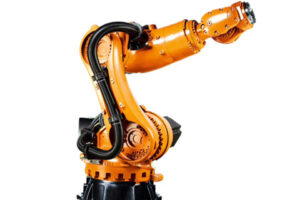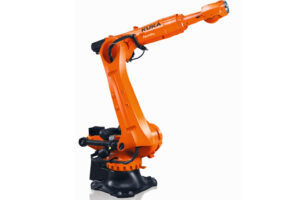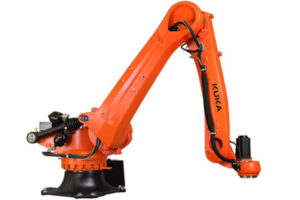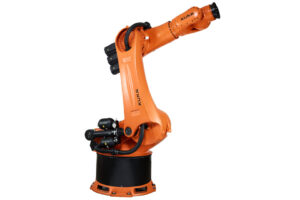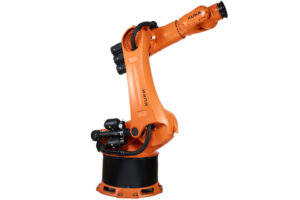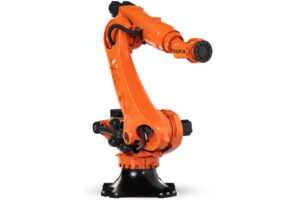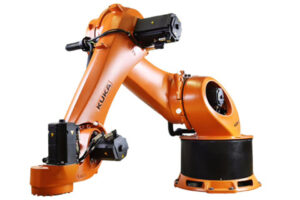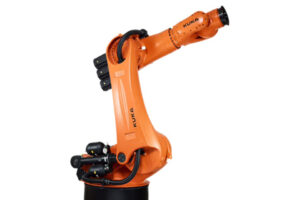
روبوتات KUKA: أتمتة إنتاج البطاريات للتنقل الإلكتروني
جدول المحتويات
الملخص: تستكشف هذه المقالة الدور الحاسم لروبوتات KUKA في إنتاج البطاريات الحديثة، وخاصة للسيارات الكهربائية. تعرّف على كيفية قيام حلول الأتمتة من KUKA AG بتبسيط سلسلة العمليات وتحسين الكفاءة وضمان استدامة تجميع خلايا البطاريات وحزمها. اكتشف لماذا تُعد خبرة KUKA في مجال الروبوتات الصناعية ضرورية لتلبية الطلب المتزايد على بطاريات الليثيوم أيون في ثورة التنقل الإلكتروني.
ما أهمية الأتمتة في إنتاج البطاريات الحديثة؟
لم تعد الأتمتة رفاهية بل ضرورة في إنتاج البطاريات الحديثة. إن الطلب على بطاريات الليثيوم أيون، مدفوعًا بظهور السيارات الكهربائية، آخذ في الارتفاع، ولا يمكن للعمليات اليدوية ببساطة مواكبة ذلك. يسمح الإنتاج الآلي، خاصة مع استخدام الروبوت الصناعي، بإنتاجية أعلى بكثير، مما يضمن قدرة الشركات المصنعة للبطاريات على تلبية متطلبات السوق.
وعلاوة على ذلك، يتطلب إنتاج البطاريات دقة واتساقًا شديدين. حتى الانحرافات الطفيفة في سلسلة العمليات يمكن أن تؤثر على أداء وسلامة المنتج النهائي. تقلل الأتمتة الروبوتية، بدقتها المتأصلة وقابليتها للتكرار، من هذه الاختلافات، مما يضمن جودة متسقة ويقلل من مخاطر العيوب. توفر KUKA حلولاً روبوتية ومفاهيم شاملة لكل عملية على حدة.
كيف تعزز روبوتات KUKA الكفاءة في إنتاج خلايا البطارية؟
تعمل روبوتات KUKA على تعزيز الكفاءة في إنتاج خلايا البطاريات بطرق عديدة. ينطوي إنتاج خلايا البطاريات على العديد من المهام المعقدة والمتكررة، مثل مناولة المواد، وتكديس الأقطاب الكهربائية، ولحام الألواح، وتعبئة الإلكتروليت. تعتبر روبوتات KUKA، بما في ذلك الموديلات من سلسلة KR مثل KR AGILUS، مناسبة بشكل مثالي لهذه المهام.
على سبيل المثال، تُعد روبوتات KUKA KR SCARA مثالية لعمليات الالتقاط والوضع عالية السرعة التي تنطوي على تكديس الأقطاب الكهربائية. تعمل سرعتها ودقتها على تقليل زمن الدورة وتحسين الإنتاجية الإجمالية. وبالمثل، تتفوق روبوتات KUKA في التصنيع الآلي الدقيق بالليزر واللحام وأنظمة القياس والفحص المرتبطة بها لتجميع خلايا البطارية، مما يضمن توصيلات آمنة وموثوقة. تقدم KUKA أيضًا روبوتات فردية لإكمال خطوط الإنتاج لإنتاج الليثيوم أيون.
ما الدور الذي تلعبه روبوتات KUKA الصناعية في إنتاج السيارات الكهربائية؟
يلعب الروبوت الصناعي من KUKA دورًا حيويًا في عملية إنتاج السيارات الكهربائية بأكملها. فهي لا تُستخدم فقط في إنتاج البطاريات ولكن أيضًا في تجميع المكونات الأخرى، مثل المحركات الكهربائية وهياكل السيارات. إن خبرة KUKA الممتدة لسنوات عديدة في صناعة السيارات تجعلها شريكًا موثوقًا به لمصنعي السيارات الذين ينتقلون إلى إنتاج السيارات الكهربائية.
تُستخدم روبوتات KUKA في مهام مثل التعامل مع المكونات الثقيلة، ولحام أجزاء الهيكل، وتطبيق المواد اللاصقة، وإجراء عمليات فحص الجودة. مرونتها وقابليتها للتكيف تجعلها مناسبة لمجموعة واسعة من التطبيقات، مما يسمح للمصنعين بتبسيط خطوط الإنتاج وتحسين الكفاءة الكلية. توفر KUKA حلولاً لكل خطوة عملية فردية في إنتاج البطاريات.
كيف تساهم KUKA في سلسلة القيمة الكاملة لإنتاج البطاريات؟
تمتد مشاركة شركة KUKA عبر سلسلة القيمة الكاملة لإنتاج البطاريات، بدءًا من المعالجة الأولية للمواد الخام إلى التجميع النهائي لحزم البطاريات وإعادة تدويرها في نهاية المطاف. تطور KUKA تقنيات الإنتاج وحلول الأتمتة المستدامة لتصنيع البطاريات. وهي تقدم حلولاً لإنتاج خلايا البطاريات، بما في ذلك تصنيع الأقطاب الكهربائية وتجميع الخلايا.
كما توفر KUKA أيضًا حلول الأتمتة لإنتاج الوحدات، حيث يتم تجميع خلايا البطارية الفردية في وحدات وتجميع الحزم، حيث يتم دمج الوحدات لإنشاء حزمة البطارية النهائية. تلعب KUKA دورًا رائدًا في تطوير تقنيات عملية مستدامة لإنتاج البطاريات، بما في ذلك حلول تفكيك بطاريات السيارات الكهربائية. تطور KUKA مفاهيم لكل خطوة عملية فردية في إنتاج البطاريات.
ما هي حلول الأتمتة التي تقدمها KUKA لتجميع وحدات البطاريات والحزم؟
بالنسبة لوحدات البطاريات وتجميع العبوات، تقدم KUKA مجموعة شاملة من حلول الأتمتة. ويشمل ذلك أنظمة روبوتية لمناولة خلايا البطاريات ووضعها، ولحام وصلات البطاريات، وتطبيق المواد اللاصقة ومانعات التسرب، وإجراء فحوصات الجودة. توفر هذه الروبوتات دقة عالية.
تُعد خبرة KUKA في اللحام ذات قيمة خاصة في تجميع وحدات البطاريات وحزم البطاريات. فهي توفر حلولًا لتقنيات اللحام المختلفة، بما في ذلك اللحام بالليزر واللحام بالمقاومة، مما يضمن توصيلات قوية وموثوقة بين الخلايا والوحدات. توفر KUKA أيضًا أنظمة لاختبار أداء وسلامة وحدة البطارية المجمعة وحزمة البطارية.
كيف تعالج KUKA الحاجة إلى الإنتاج المستدام للبطاريات؟
تُعد الاستدامة مصدر قلق متزايد في إنتاج البطاريات، وتلتزم شركة KUKA بتطوير حلول تقلل من التأثير البيئي وتعزز كفاءة استخدام الموارد. ويشمل ذلك تصميم روبوتات موفرة للطاقة وتطوير عمليات تقلل من النفايات والانبعاثات. تضع KUKA معايير جديدة.
كما تشارك KUKA بنشاط في تطوير تقنيات إعادة تدوير بطاريات الليثيوم أيون. ويشمل ذلك الأنظمة الروبوتية للتفكيك الآمن والفعال لحزم البطاريات، مما يسمح باستعادة المواد القيمة مثل الليثيوم والكوبالت والنيكل. تساهم هذه الجهود في تحقيق اقتصاد أكثر دائرية للبطاريات، مما يقلل من الاعتماد على المواد البكر ويقلل من البصمة البيئية لإنتاج البطاريات. ترمز Kuka إلى الابتكارات طويلة الأمد والإنتاج المستدام.
ما هي الفوائد الرئيسية لاستخدام روبوتات KUKA في تصنيع البطاريات؟
فوائد استخدام روبوتات KUKA في تصنيع البطاريات واسعة النطاق:
- زيادة الإنتاجية: تعمل الروبوتات بشكل أسرع وأكثر اتساقًا من البشر، مما يؤدي إلى ارتفاع معدلات الإنتاج.
- تحسين الجودة: تقلل الدقة الروبوتية من العيوب وتضمن جودة المنتج المتسقة.
- تعزيز السلامة المعززة: تتعامل الروبوتات مع المهام الخطرة، مما يقلل من خطر إصابة العمال البشريين.
- انخفاض التكاليف: تقلل الأتمتة من تكاليف العمالة وتقلل من هدر المواد.
- المرونة: يمكن إعادة برمجة الروبوتات بسهولة للتكيف مع المهام ومتطلبات الإنتاج المختلفة.
- قابلية التوسع: يمكن رفع مستوى الأنظمة الروبوتية أو خفضه لتلبية متطلبات الإنتاج المتغيرة.
- الاستدامة: يساهم تركيز شركة KUKA على كفاءة الطاقة وإعادة التدوير في جعل صناعة البطاريات أكثر استدامة.
- أنظمة إنتاج البطاريات: تشمل الذراع الروبوتية.
ما هي موديلات روبوتات KUKA الشائعة الاستخدام في خطوط إنتاج البطاريات؟
العديد من طرازات روبوتات KUKA مناسبة تمامًا للاستخدام في خطوط إنتاج البطاريات. تُعد سلسلة KR AGILUS خيارًا شائعًا للتعامل مع المكونات الأصغر وأداء مهام التجميع الدقيقة. حجمها الصغير وسرعتها العالية يجعلها مثالية لمهام مثل تحميل وتفريغ خلايا البطارية ووضعها في وحدات.
توفر سلسلة KR CYBERTECH سعة حمولة أعلى ومدى وصول أطول، مما يجعلها مناسبة للتعامل مع وحدة البطارية الأكبر حجمًا وحزمة البطاريات. غالبًا ما تُستخدم هذه الروبوتات في مهام مثل لحام وصلات البطارية وتجميع مبيت البطارية. كما تقدم KUKA أيضًا روبوتات SCARA المتخصصة، مثل KR SCARA، لعمليات الالتقاط والتركيب عالية السرعة، مثل تكديس الأقطاب الكهربائية أثناء إنتاج خلايا البطارية.
كيف تدعم KUKA تحول صناعة السيارات إلى السيارات الكهربائية؟
تلعب شركة KUKA دورًا حاسمًا في دعم تحول صناعة السيارات إلى السيارات الكهربائية. إن خبرتها في أتمتة إنتاج البطاريات ضرورية لتلبية الطلب المتزايد على بطاريات الليثيوم أيون. توفر شركة KUKA حلول أتمتة شاملة تغطي سلسلة العمليات بأكملها، بدءًا من إنتاج خلايا البطارية وحتى التجميع النهائي للسيارة الكهربائية.
إن علاقات KUKA طويلة الأمد مع كبرى شركات تصنيع السيارات، إلى جانب خبرتها الواسعة في مجال أتمتة السيارات، تجعلها شريكًا موثوقًا به للشركات التي تتنقل في التحول إلى التنقل الإلكتروني. تقدم KUKA أيضًا دورات تدريبية ودعمًا فنيًا لمساعدة الشركات المصنعة على دمج أنظمتها الروبوتية وتحسينها.
ما هو مستقبل كوكا للروبوتات في إنتاج البطاريات؟
مستقبل روبوتات KUKA في إنتاج البطاريات مشرق. مع استمرار نمو الطلب على السيارات الكهربائية، ستزداد الحاجة إلى إنتاج بطاريات فعالة ومستدامة. وتتمتع شركة KUKA بمكانة جيدة لتلبية هذا الطلب، مع التزامها المستمر بالابتكار وخبرتها العميقة في مجال الأتمتة.
يمكننا أن نتوقع أن نشهد المزيد من التطورات في تكنولوجيا الروبوتات، بما في ذلك تطوير روبوتات أكثر ذكاءً وقابلية للتكيف. ستكون هذه الروبوتات قادرة على التعامل مع المهام المعقدة بشكل متزايد، مما يزيد من تحسين الكفاءة والجودة في إنتاج البطاريات. ستواصل شركة KUKA أيضاً التركيز على الاستدامة، وتطوير حلول تقلل من التأثير البيئي لتصنيع البطاريات وتعزز الاقتصاد الدائري. وهي ملتزمة بتحسين معايير الجودة. يلعب روبوت KUKA دورًا مهمًا للغاية في مجال التنقل الإلكتروني.
- الأتمتة الأساسية: تُعد روبوتات KUKA ضرورية لأتمتة إنتاج البطاريات.
- التركيز على التنقل الإلكتروني: حلول موجهة نحو صناعة السيارات الكهربائية.
- سلسلة القيمة بأكملها: تغطي KUKA جميع مراحل إنتاج البطاريات.
- الكفاءة والجودة: تعمل الروبوتات على تحسين سرعة الإنتاج واتساق المنتج.
- الاستدامة: تعطي KUKA الأولوية لتقنيات الإنتاج المستدام.
- نماذج الروبوتات المتنوعة: تُستخدم روبوتات KUKA المختلفة لمهام محددة.
- شريك السيارات: تدعم KUKA الشركات المصنعة للسيارات في انتقالها إلى السيارات الكهربائية.
- الابتكار المستقبلي: استمرار التقدم في مجال الروبوتات لإنتاج البطاريات.
- تجميع الوحدات والحزمة: حلول متخصصة لهذه العمليات.
- الطلب العالمي: تلبية الطلب المتزايد على بطاريات الليثيوم أيون.
التعليقات
الوسوم
- 09:00 - 21:00
- +86 159 1010 0309
- [email protected]
روبوت كوكا: الحافة والتحدي في ثورة الأتمتة الصناعية
باعتبارها واحدة من أربع عائلات رئيسية من الروبوتات الصناعية في العالم، أطلقت KUKA موجة من الذكاء في الصناعة التحويلية بتصميمها المعياري وابتكاراتها في التعاون بين الإنسان والآلة.
روبوتات KUKA والجيل الجديد من المهندسين: بناء منظومة مواهب للتصنيع الذكي
في الوقت الذي تتكامل فيه الصناعة 4.0 والتصنيع الذكي بشكل عميق، تبني KUKA Robots جسراً بين التعليم الجامعي واحتياجات الصناعة من خلال نظام التعليم التعاوني بين المدارس والشركات ومسار التطوير الوظيفي الكامل.
روبوت كوكا: المحرك الذكي لإعادة تشكيل أتمتة خطوط إنتاج السيارات
في عملية انتقال صناعة تصنيع السيارات نحو الصناعة 4.0، أصبحت روبوتات KUKA القوة الدافعة الأساسية لذكاء خطوط الإنتاج بفضل دقة تحديد المواقع على مستوى المليمتر وقدرات التكامل الرقمي للعمليات الكاملة.
روبوت الطحن الآلي من KUKA: ثورة ثورية في الأتمتة باستخدام الحاسب الآلي
في مجال التصنيع الآلي الدقيق الذي تهيمن عليه أدوات ماكينات التحكم الرقمي CNC التقليدية، تعمل روبوتات الطحن من KUKA على إعادة تشكيل المنطق الأساسي للصناعة التحويلية من خلال التحكم التعاوني متعدد المحاور ونظام البرمجيات الذكي.
روبوت KUKA: القوة الابتكارية لتكنولوجيا البرمجة والأتمتة
في موجة الصناعة 4.0 والتصنيع الذكي، أصبحت روبوتات KUKA القوة الدافعة الأساسية للتحول في الصناعة التحويلية العالمية بفضل مرونة البرمجة الممتازة وقدرات الأتمتة الممتازة.
KUKA LBR Med: روبوت حساس بسبعة محاور يعيد تشكيل تسعة نماذج تقنية للرعاية الصحية
على خلفية التوسع السريع لسوق الروبوتات الطبية بمعدل نمو سنوي مركب يبلغ 19.31 تيرابايت 3 تيرابايت، يعيد الروبوت التعاوني ذو السبعة محاور من KUKA LBR Med تشكيل السيناريوهات الطبية الأساسية.
ثورة الروبوتات: سبعة محركات تكنولوجية تعيد بناء نموذج التصنيع الصناعي 4.0
في موجة الثورة الصناعية 4.0، تعمل تكنولوجيا الروبوتات على إعادة تشكيل الصناعة التحويلية العالمية بمعدل نمو سنوي مركب يبلغ 231 تيرابايت في الساعة.
روبوتات KUKA الطبية: سبعة ابتكارات تكنولوجية لإعادة تشكيل الصناعة الطبية في عام 2025
في ظل الضغوط المزدوجة المتمثلة في شيخوخة السكان ونقص الموارد الطبية، تعمل شركة KUKA للروبوتات الطبية على إعادة تشكيل المشهد الطبي العالمي من خلال سبعة ابتكارات تكنولوجية.
توحيد الجهود مع شركة KUKA: إحداث ثورة في عمليات الربط باستخدام الأتمتة الروبوتية
تستكشف هذه المقالة كيف تقوم شركة KUKA Robotics بتحويل عمليات الانضمام في مختلف الصناعات.
KUKA مقابل FANUC مقابل ABB: مقارنة الاختلافات الرئيسية في مجال الروبوتات
يمكن أن يكون الاختيار بين عمالقة الروبوتات الصناعية - كوكا، وفانوك، وABB - قرارًا معقدًا.


